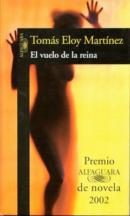
by Tomás Eloy Martínez
I just wanted to read a book in Spanish. The acclaimed author of “Santa Evita” seemed to be a good choice to me. Indeed, it was. The novel starts rather confusing by switching time levels. I dare to claim with intention in oder to leave things unclear and mysterious.
The initial scene is a description of a guy who observes obsessively a young woman in an apartment across the street. The “guy” – it turns out – is a powerful newspaper editor in Buenos Aires. In snippets between long observation sessions the reader learns about his life and a late passionate love which totally trashes his way of being: self-assured, commanding, brilliant, admired, feared – the essence of power. This power will be seriously and inadvertently – almost innocently – challenged. Towards the end the novel takes up pace and you realize well thought-out it is. The good thing is that you, the reader, will be subtly suggested many final solutions. many of them even stay possible after the last page.
As a side-note here: Whilst I was reading the book I flavored my Portuguese with Argentinian-Spanish expressions and grammar. I never did this before since I learned Spanish in Chile. Maybe the similarity of the use of the Portuguese “você” and the Argentinean equivalent “vos”, which is also an anomaly in the Spanish language.
The initial scene is a description of a guy who observes obsessively a young woman in an apartment across the street. The “guy” – it turns out – is a powerful newspaper editor in Buenos Aires. In snippets between long observation sessions the reader learns about his life and a late passionate love which totally trashes his way of being: self-assured, commanding, brilliant, admired, feared – the essence of power. This power will be seriously and inadvertently – almost innocently – challenged. Towards the end the novel takes up pace and you realize well thought-out it is. The good thing is that you, the reader, will be subtly suggested many final solutions. many of them even stay possible after the last page.
As a side-note here: Whilst I was reading the book I flavored my Portuguese with Argentinian-Spanish expressions and grammar. I never did this before since I learned Spanish in Chile. Maybe the similarity of the use of the Portuguese “você” and the Argentinean equivalent “vos”, which is also an anomaly in the Spanish language.
Facts:
English title: Flight of the Queen
Original title: El vuelo de la reina
Published: 2002
